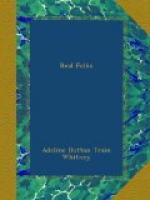Do you ever imagine how different this winter’s parties are from last, or this summer’s visit or journey from those of the summer gone,—to many a maiden who has her wardrobe made up all the same, and takes her German or her music lessons, and goes in and out, and has her ticket to the Symphony Concerts, and is no different to look at, unless perhaps with a little of the first color-freshness gone out of her face,—while secretly it seems to her as if the sweet early symphony of her life were all played out, and had ended in a discord?
We begin, most of us, much as we are to go on. Real or mistaken, the experiences of eighteen initiate the lesson that those of two and three score after years are needed to unfold and complete. What is left of us is continually turning round, perforce, to take up with what is left of the world, and make the best of it.
Thus much for what does happen, for what we have to put up with, for the mere philosophy of endurance, and the possibility of things being endured. We do live out our years, and get and bear it all. And the scars do not show much outside; nay, even we ourselves can lay a finger on the place, after a little time, without a cringe.
Desire Ledwith did what she had to do; there was a way made for her, and there was still life left.
But there is a better reading of the riddle. There is never a “Might-have-been” that touches with a sting, but reveals also to us an inner glimpse of the wide and beautiful “May Be.” It is all there; somebody else has it now while we wait; but the years of God are full of satisfying, each soul shall have its turn; it is His good pleasure to give us the kingdom. There is so much room, there are such thronging possibilities, there is such endless hope!
To feel this, one must feel, however dimly, the inner realm, out of which the shadows of this life come and pass, to interpret to us the laid up reality.
“The real world is the inside world.”
Desire Ledwith blessed Uncle Oldways in her heart for giving her that word.
It comforted her for her father. If his life here had been hard, toilsome, mistaken even; if it had never come to that it might have come to; if she, his own child, had somehow missed the reality of him here, and he of her,—was he not passed now into the within? Might she not find him there; might they not silently and spiritually, without sign, but needing no sign, begin to understand each other now? Was not the real family just beginning to be born into the real home?
Ah, that word real! How deep we have to go to find the root of it! It is fast by the throne of God; in the midst.
Hazel Ripwinkley talked about “real folks.” She sifted, and she found out instinctively the true livers, the genuine neahburs, nigh-dwellers; they who abide alongside in spirit, who shall find each other in the everlasting neighborhood, when the veil falls.




